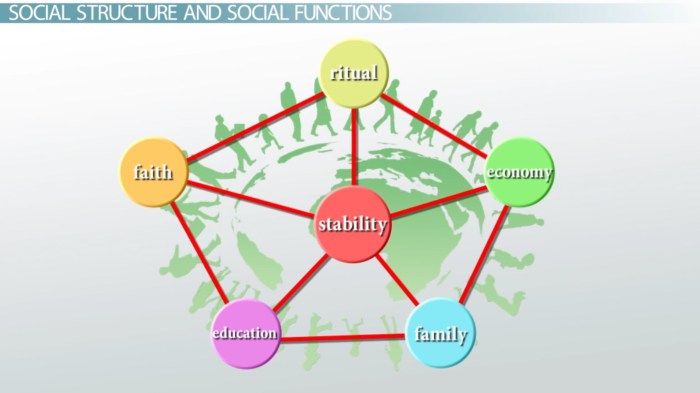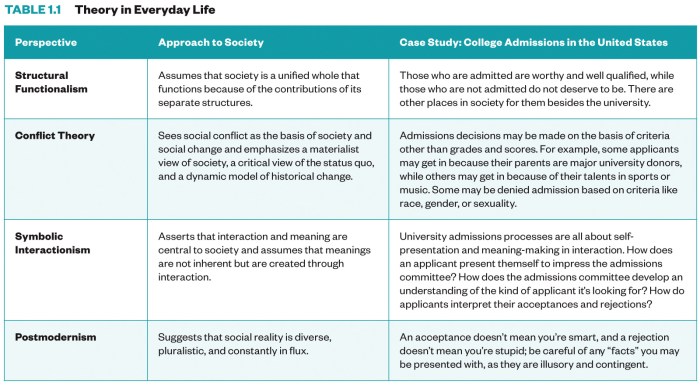The real world: an introduction to sociology 8th edition pdf – Welcome to the realm of sociology, as unveiled in “The Real World: An Introduction to Sociology, 8th Edition PDF.” This comprehensive guide delves into the intricacies of human behavior and social structures, offering a profound understanding of the world we inhabit.
Within these pages, you will embark on a journey that explores the fundamental concepts of sociology, unraveling the complexities of culture, socialization, and social inequality. Prepare to be enlightened as we delve into the nature of deviance, social control, and the ever-evolving landscape of social change.
Introduction to Sociology
Sociology is the scientific study of human society and social behavior. It is a broad and interdisciplinary field that examines the social world from a variety of perspectives, including the micro level (individual interactions) and the macro level (large-scale social structures).
Sociologists are interested in understanding how social institutions, such as the family, education, and religion, shape our lives. They also study social problems, such as poverty, crime, and inequality, and develop policies to address them.
Major Theoretical Perspectives in Sociology
There are three main theoretical perspectives in sociology: functionalism, conflict theory, and symbolic interactionism. Functionalism views society as a system of interconnected parts that work together to maintain equilibrium. Conflict theory sees society as a struggle between different groups for scarce resources.
Symbolic interactionism focuses on the way that people interact with each other and how these interactions create meaning.
Examples of How Sociology Is Used to Understand the Real World
Sociology is used to understand a wide range of social phenomena, including:
- The causes and consequences of poverty
- The role of education in social mobility
- The impact of social media on relationships
- The challenges faced by immigrants
Culture and Society

Culture is the shared beliefs, values, and practices of a group of people. It shapes our behavior and our understanding of the world. Society is the organized system of social relationships that exists within a particular territory. It is made up of institutions, such as the family, education, and government, that provide the framework for our lives.
The Relationship Between Culture and Society
Culture and society are closely related. Culture is the product of society, and society is shaped by culture. The values and beliefs of a culture are reflected in the institutions and practices of society. For example, a culture that values individualism is likely to have a society that emphasizes individual rights and freedoms.
Socialization and the Life Course

Socialization is the process by which we learn the values, beliefs, and behaviors of our culture. It begins in childhood and continues throughout our lives. The agents of socialization include our parents, teachers, peers, and the media. The life course is the sequence of social roles and statuses that we occupy over our lifetime.
It is shaped by our age, gender, race, and class.
The Impact of Social Institutions on Socialization and the Life Course
Social institutions play a major role in socialization and the life course. The family is the primary agent of socialization in childhood. Schools provide formal education and teach us the skills we need to succeed in society. The workplace is a major source of socialization in adulthood.
The government provides social welfare programs that support us throughout our lives.
Social Inequality

Social inequality is the unequal distribution of resources and opportunities in society. It can be based on factors such as race, gender, class, and age. Social inequality has a number of negative consequences, including poverty, crime, and health problems.
The Causes and Consequences of Social Inequality
The causes of social inequality are complex and varied. They include discrimination, unequal access to education and healthcare, and the concentration of wealth in the hands of a few. The consequences of social inequality are also far-reaching. It can lead to social unrest, political instability, and economic stagnation.
The Role of Social Institutions in Perpetuating and Reducing Social Inequality
Social institutions can both perpetuate and reduce social inequality. For example, the education system can perpetuate inequality by providing better opportunities for children from wealthy families. However, the government can also use social welfare programs to reduce inequality by providing support to low-income families.
Deviance and Social Control: The Real World: An Introduction To Sociology 8th Edition Pdf
Deviance is behavior that violates social norms. It can range from minor infractions, such as jaywalking, to serious crimes, such as murder. Social control is the set of mechanisms that society uses to prevent and punish deviance.
The Causes and Consequences of Deviance
The causes of deviance are complex and varied. They include biological factors, such as mental illness, and social factors, such as poverty and discrimination. The consequences of deviance can also be severe. Deviants may be stigmatized, ostracized, or even punished by the law.
The Role of Social Institutions in Controlling Deviance
Social institutions play a major role in controlling deviance. The family is the primary agent of socialization, and it teaches children the values and norms of society. Schools provide formal education and help to integrate students into society. The workplace provides opportunities for people to earn a living and contribute to society.
The government enacts laws and regulations to prevent and punish deviance.
Social Change

Social change is the process by which society changes over time. It can be caused by a variety of factors, including technological innovation, economic development, and political revolutions.
The Causes and Consequences of Social Change
The causes of social change are complex and varied. They include technological innovation, economic development, and political revolutions. The consequences of social change can also be far-reaching. It can lead to new opportunities and challenges for individuals and societies.
The Role of Social Institutions in Facilitating and Resisting Social Change
Social institutions can both facilitate and resist social change. For example, the education system can facilitate social change by providing people with the skills they need to succeed in a changing economy. However, the government can also resist social change by enacting laws and regulations that protect the status quo.
The Future of Sociology
Sociology is a rapidly growing field that is constantly evolving. New technologies and social trends are creating new challenges and opportunities for sociologists. The future of sociology is bright, and the field is well-positioned to make a significant contribution to our understanding of the social world.
The Challenges and Opportunities Facing Sociology in the 21st Century, The real world: an introduction to sociology 8th edition pdf
Sociology faces a number of challenges in the 21st century. These include the increasing complexity of the social world, the growing gap between rich and poor, and the rise of new technologies. However, sociology also has a number of opportunities in the 21st century.
These include the development of new research methods, the increasing availability of data, and the growing public interest in sociology.
The Role of Sociology in Shaping the Future of Human Society
Sociology has the potential to play a major role in shaping the future of human society. By understanding the social world, we can better address the challenges we face and create a more just and equitable world.
Essential FAQs
What is the primary focus of sociology?
Sociology primarily investigates human behavior and the patterns that emerge from social interactions, examining how individuals and groups shape and are shaped by their social environment.
How does “The Real World: An Introduction to Sociology, 8th Edition PDF” contribute to sociological understanding?
This comprehensive guide provides a systematic exploration of key sociological concepts, offering a deeper understanding of the social world and the factors that influence human behavior.
What are the key themes covered in “The Real World: An Introduction to Sociology, 8th Edition PDF”?
The book covers a wide range of topics, including culture, socialization, social inequality, deviance, social control, and social change, providing a comprehensive overview of the field.